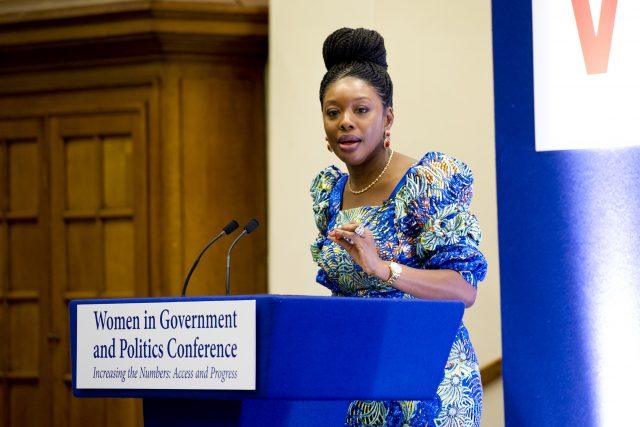Figure 1: Winihin Ayuli-Jemide speaking at a conference, Source: Democracy in Africa 2016
Thus far in this series of blogs
I have reflected on the disadvantages women face in relation to inadequate
water provisioning. Whilst the time commitment to water collection can be seen
to entrench gender disparities, it offers an important opportunity for women’s
empowerment. Women have accumulated considerable knowledge about water
resources through household water management (UN Water 2006: 1). In addition to this, the
unique sanitation needs of women require gender-specific solutions. As a
result, women are well-placed to contribute to water governance. Additionally,
a growing body of evidence shows that women’s involvement with water management
improves efficiency, effectiveness and sustainability of projects (Kholif and Elfarouk 2014: 75).
Whilst it is clear that women
offer important knowledge resources for water management, women are under-represented
in resource decision-making institutions in Africa (Kameri-Mbote 2006: 44). This can be considered
the result of cultural norms which identify the domestic sphere as the female
domain, and women do not have time to participate as a result of domestic
responsibility and do not feel empowered to speak up in what they perceive as a
male domain (Ilesanmi 2018: 5).
To overcome this, it has been
noted that Information and Communication Technologies (ICTs) afford women the
capacity to expand their political participation from inside the home. In Kano,
Nigeria, WhatsApp has been identified as a key forum which has allowed women to
voice their political opinions and concerns (Abubakar and Dasuki 2018: 172). Whilst it can be
argued that these systems fail to address the underlying cultural norms which
prevent female participation, they present a feasible route to including women
in decision making.
Alternatively, legally enforced
gender-quotas have been introduced across Africa to enhance women’s
participation in decision-making. In 2002, Malawi mandated the inclusion of women
in decision-making processes concerning water resources (Chiweza et al. 2015: 262). Since then, women’s
participation in Water User Associations (WUAs) has increased, for example,
there are now more women than men involved in Lilongwe WUAs. However, the
progress that has been made in women’s participation can be considered
superficial. Two separate studies, one in Blantyre and the other in Lilongwe
draw attention to the gendered-division of labour within these organisations.
Women tend to occupy lower-grade positions such as water sellers and kiosk
attendants while men occupy managerial positions (Figures 2, 3 and 4) (Adams et al. 2018: 138; Chiweza et al. 2015: 265).
Figure 2: A table showing the gender makeup of different WUA
positions in Lilongwe, Source:
Adams et al. 2018: 138
Whilst it is clear that women
have an important role to play in water management, there is clearly a need to
improve on the ways they are currently involved in water governance. Central to
this, will be tackling the cultural norms which confine women to domestic roles
and limit their political engagement. If we genuinely seek a gender-equal
future, empowering and listening to women will be essential to solving the
issues that disadvantage them.



You have demonstrated a good understanding of water issues in Africa from the perspective of gender/equalityt The engagement with relevant literature is good with a balance mix of sources, but the referencing were not embedded. Also, details about the experience of Water and gender in Malawi would be helpful, especailly the sociocultural and religious context that promotes and sustains gender/equality issues.
ReplyDeleteThank you for your feedback Clement! With regards to the social/ cultural context of Malawi, in 2022, The International Institute for Environment and Development conducted a gender audit amongst tea farmers in Malawi (whilst I understand that this blog does not concern farming in particular, farming is one important user of water resources and this resource is useful to my understand of local gender stereotypes). The main takeaway from this study was that women are socialised to let men go first. This means that, whilst women do believe that they can lead and have the skills to do so, they will not take a leadership opportunity as they feel it is a ‘man’s role’. In other words, women are held back by cultural stereotypes. In addition to this, Malawian society assumes that women’s knowledge is limited to working the field whilst men are talented in negotiation, logically following this then, men fill leadership and negotiation roles. It’s clear that dismantling these norms will be essential to increasing women’s participation in water management discussions.
DeleteHere is the link to the Gender Audit I referenced: https://www.iied.org/legal-empowerment-gender-lens-how-women-tea-farmers-malawi-are-claiming-their-rights (I am having technical difficulties embedding it into the text of the comment)
DeleteI really liked how this blog showed a critical insight into women as water managers, and the barriers they face, such as occupying lower-grade positions, despite being technically represented in the workforce. Your mention of the ICT solution to expand women's political participation was interesting- do you think, however, this solution may be challenging to implement, considering women may face the barrier of uneven access or ownership to ICT?
ReplyDeleteThank you for your comment Maya! This is a really interesting point to raise. The 2022 Mobile Gender Gap Report found that there was a 37% Gender gap in mobile internet use so it is clear that disparities in access to ICT might limit the effectiveness of solutions like the one I mentioned above. However, the report also noted that awareness and access to the internet are rapidly growing in the global South. As improvements in these areas are made such solutions might become increasingly successful. Ultimately, efforts must focus on challenging and dismantling the patriarchal norms to address the root of the problem. However, it is unlikely that this can be achieved overnight, so whilst women are still limited by such norms, the use of ICTs can still provide an important interim solution.
DeleteHere is the link to the Report I referenced: https://www.gsma.com/r/wp-content/uploads/2022/06/The-Mobile-Gender-Gap-Report-2022.pdf?utm_source=website&utm_medium=download-button&utm_campaign=gender-gap-2022 (I am having technical difficulties embedding it into the text of the comment)
Delete